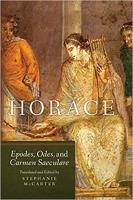
Oklahoma (2020) p/b 594pp £29.50 (ISBN 9780806164878)
Translating the Odes of Horace is always a compromise. Some translators, like the 19th C prime minster William Gladstone and the present reviewer, have opted for English rhyming verse to reflect Horace’s musicality. Others prioritize linguistic accuracy, setting out lines in Horatian silhouettes, but with results that read like prose. M. pursues a middle course, using English iambic pentameters for most Odes, with a five-syllable coda to end her Sapphic stanzas. Her primary audience is students of literature and she aims to ‘present readers with a literal but also poetic and metrical translation’.
M. is a committed teacher and this is an admirable project. After a 31-page introduction, Horace’s Latin and M.’s translations are set out in parallel text with explanatory footnotes. There is a 10-page glossary of rhetorical and literary terms, followed by a bibliography.
The introduction summarizes the life and works of Horace and the events of Augustus’s early principate. There follow discussions of the Epodes and Odes and Horace’s attitudes to religion, friendship, the symposium, sexuality, death, and the Roman city and countryside. M. acknowledges that Horace is a ‘melic’ poet but confines her metrical analysis to Alcaics and Sapphics and gives no explanation of the principles of elision. Given the brevity of the introduction, it would be unreasonable to criticize every omission, but where M. ventures opinions it is fair to scrutinize them. Here and in the footnotes, she is weak on Horace’s escape from the naval disaster at Palinurus (for which Virgil wrote an apologia in the Aeneid), the sources of Augustus’s power (including control over the civil census and the religious college of quindecimviri), and Maecenas’s fall from grace after an attempted coup d’état in which his brother-in-law was implicated. All these are alluded to by authors in antiquity.
The rhythmic flow of M.’s iambic pentameters generally works well. Lapses in translation arise where Horace uses the language of commerce or where M. makes poor choices. She seems to miss the extended metaphor in the Soracte Ode (1.9). She translates lucro as ‘gain’ but renders pignus as ‘memento’ instead of ‘pledge’; composita repetantur hora was the agreed time for a debt to be reclaimed by the lender—the reference is to the sports field, not the plain. Similarly, in Ode 3.24.64, curtae means ‘shortages’ or ‘deficits’; in Ode 2.6.23, the tear is not so much ‘required’ as ‘owed’.
Rendering poetry in translation is a matter of personal taste and poetic instinct. However, M.’s individualistic approach to vocabulary is not always successful. To her, superbus (normally translated ‘proud’) is almost invariably ‘pompous’ and saevus is ‘ruthless’. She sees turmae as ‘throngs’ not ‘squadrons’; sospes as ‘rescued’, not ‘safe’; dura as ‘sorrows’ not ‘hardships’. Latus (‘side’) becomes ‘flank’; carpere iter (‘to embark on a journey’) becomes ‘trek’; tangere (‘touch’) is ‘thwack’, and ludere (‘play’) is ‘prance’; iecur, the seat of the emotions (our ‘heart’), is rendered literally as ‘liver’ throughout. Many of these choices have unintended consequences for the poetic sentiment. In Ode 2.5.15-16, iam proterva fronte petet Lalage maritum is not ‘Soon with a brazen brow will Lalage dash against a mate’; rather, with her pert expression, she will be looking for a husband. In Ode 2.12.23, the point is that you would not exchange a single hair of Licymnia’s for all the world’s riches. In Ode 4.7.6, nuda would be better rendered as ‘unclothed’ than ‘in the nude’.
Sometimes, M. rejects translations that have passed into the common language: in Ode 1.5.11, nescius aurae fallacis (where the correct translation is ‘not knowing the false breeze’) becomes ‘not aware the breeze deceives’; in Ode 3.2.20, arbitrio popularis aurae (‘the judgment of the popular breeze’) becomes ‘according to the fickle people’s whim’. In Ode 1.33.7-8, the wolves in Apulis lupis have become ‘lions’. In Ode 2.7.12, turpe is accusative and must agree with solum. In 2.17.24, volucris is surely genitive, agreeing with Fati. In 2.14.22, harum are ‘these’ not ‘those’. In Ode 4.9.32-4, non … totve tuos patiar labores / impune, Lolli, carpere lividas / obliviones, the meaning is not ‘nor suffer envious oblivion to steal scot-free your praises’, but ‘nor suffer with impunity your many labours to harvest a bruised crop of forgetfulness’.
There is no such things as a perfect verse translation. The critical question is whether the translator conveys in their own language the poetic sense, sentiment and musicality of the original. At the end of Ode 2.14, Horace composes a wonderfully epigrammatic conclusion:
absumet heres Caecuba dignior
servata centum clavibus et mero
tinget pavimentum superbo
pontificum potiore cenis.
M. renders this as:
A worthier heir will squander that Caecuban
you safeguard with a hundred keys. He’ll stain
the pavement with unmixed and pompous wine,
better than what they drink at pontiff’s banquets.
Similarly, Horace has written a beautiful ending to Ode 1.13:
felices ter et amplius
quos irrupta tenet copula nec malis
divulsus querimoniis
suprema citius solvet amor die.
M. writes:
Thrice blessed and even more are those
whom an unbroken bond holds fast, whom love,
not torn apart by base complaints,
will split no sooner than the final day.
Her desire to provide a literal translation has diminished the poetry of the original. Contrast this with a recent alternative:
Thrice happy those and more than thrice
Whom an unbroken love knot ties;
No harsh word will their true love fray
Until they reach their dying day.
Stuart Lyons
